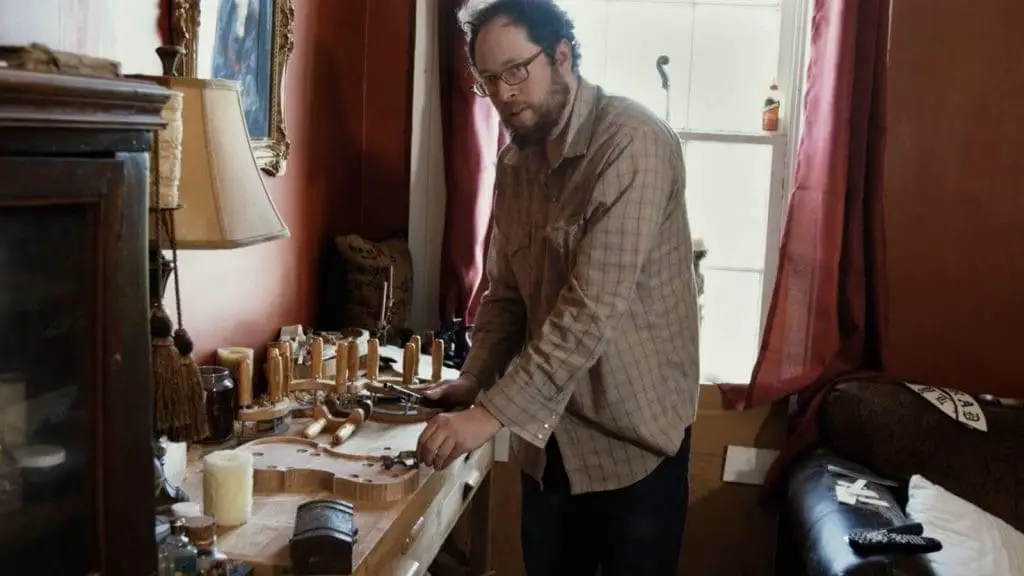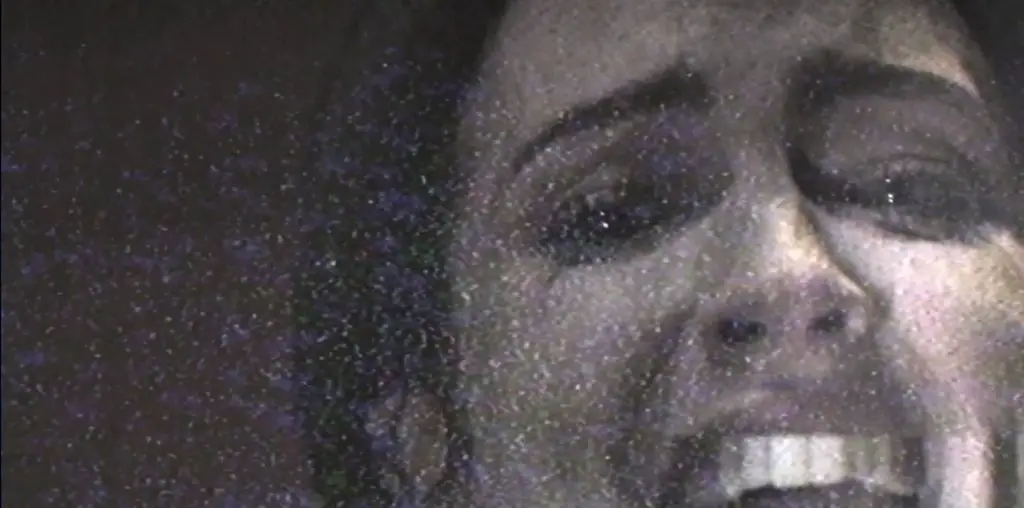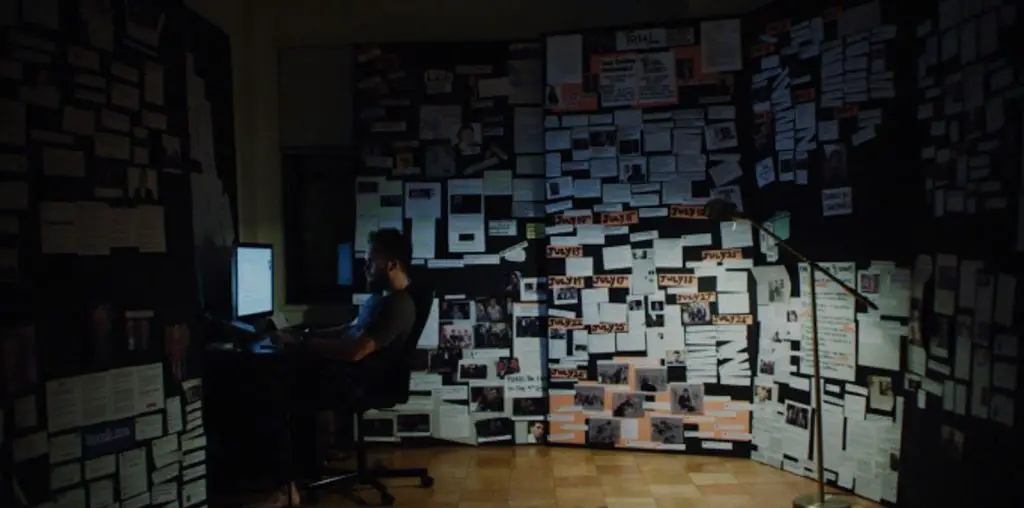
On the surface, it seemed like a surefire recipe for mini-disaster: a documentary on the sidewalk book sellers of New York, shot by a first-time filmmaker with no funds whatsoever in a hodgepodge of different formats (including Mini DV, Super 8 film, Regular 8 and Hi-8 video and Super VHS) and edited on deferred rates in far-flung locations including New Mexico and California. The result, however, turned in to an award-winning feature celebrating the basic concepts of libertarian commerce in the face of a hostile government with a tendency to bully those who lack political and financial clout.
Jason Rosette came to make “BookWars” based on his own precarious situation: he graduated from New York University with a degree in filmmaking and a financial state which could charitably described as broke. As a quick fix to gather instant money, he began selling his college texts on the street and swept up a surprising profit. An unexpected career was born as Rosette joined the ranks of New York’s sidewalk book sellers, a cheery group of eccentric bibliophiles who provide a rich mix of new, used, out-of-date and repaired books to the eager pedestrian traffic.
“BookWars” begins as a celebration of Rosette’s colleagues and their unique histories and peccadilloes (most notably, a fellow book seller with a strange fixation on toads). During the course of filming, however, the book sellers found themselves being harassed by a rabid “quality of life” program orchestrated by New York’s Mayor Rudolph Giuliani (which went to extra lengths to pick on sidewalk vendors and performers who lacked the power to fight back) and enforced by a cheerless police force who, if this film is any indication, can’t even spell “book” (and who also seem, based on the footage shot by Rosette, to take special interest in bullying the African-American and Caribbean-American book sellers). With his hand held cameras focused from his book stand on the front lines, Rosette captured a remarkable first-person vision of the threat to the livelihoods of his book selling brethren by a fairly nasty municipal system.
“BookWars” was well received at the 1999 Independent Feature Film Market (IFFM) in New York and scored the Best Documentary honors at the 2000 New York Underground Film Festival. The latter festival caught the attention of Matt Zoeller Seitz, film critic for the New York Press, who gave “BookWars” a generous full-page review which praised the documentary as “superb” and “wonderful”–long before the film’s theatrical debut was even announced!
“BookWars” was picked up by a new distributor, Avatar Films, and it will have its theatrical premiere on June 9 at Cinema Village in New York. However, “BookWars” was not transferred from video to film–Cinema Village is presenting the feature in its video format, a very rare opportunity for a shot-on-video work to be shown in a major commercial venue without having to run through a film projector.
Rosette, who has put his book seller career behind him and currently teaches at Parsons School of Design in New York, chatted with Film Threat on the amazing story behind “BookWars”:
[ You began production on “BookWars” with a borrowed camera and no funds. The disadvantages to this strategy are fairly obvious…but what were the advantages of working under such tight conditions? ] ^ The advantages are that you tend to shooting in a fairly loose and intimate fashion. You’re not obliged to adhere to any format restrictions (running time) or any particular agenda, especially an agenda put forth or mandated–officially or not–by a funding body or foundation. In my case, I decided I wanted to shoot with whatever means were at hand. Initially this meant shooting in 8mm video and Super-8 film. Now, I could have either waited around until I secured some funding so I could shoot according to some kind of safe and standard schedule (which never materialized anyway, except for a small post grant from the Playboy Foundation), or I could have gone ahead and said “f**k it” and taken that Kierkegaardian leap of faith into the unknown….and I did. And it was an enormously difficult effort, but it paid off. “BookWars” is completed, it has been sold two different broadcasters so far, and it will have a theatrical release. All this, really, from the ether, from scratch, plucked from the trees (with a hell of a lot of hard work).
[ “BookWars” runs 79 minutes. How much footage did you actually shoot for this production and what was your criteria in keeping footage in and taking sequences out? ] ^ I ended up with about 200 hours of material, some of which I lost along the way due to the fact that I was moving around the country a lot pursuing equipment as it became available. My criteria for taking stuff out… there was no hard and fast rule. It was basically trial and error, playing around with the material. But I do mean PLAYING–that the unconscious, playful effort often yields the best results, while even the most strict and conscious efforts to create some message might yield results which are wooden, stiff, and destined for the trash can.
[ While we are on the subject of editing…your film has already been sold to the European cultural TV channel Arte, albeit to run in a one-hour version. How easy was it to cut 19 minutes from the theatrical version in order to play on television…and what footage received the axe? ] ^ Obviously, for the shorter TV version (56:30), I had to cut more, so in this case I tended to remove whole scenes rather than try to shave off a shot here and there to create some kind of aggregate…and the scenes I cut were the ones which weren’t essential to that particular version or running time.
[ What were the most pleasant and unpleasant surprises that came about during the course of production? ] ^ There weren’t really any unpleasant surprises during production; it was all pretty tough and moneyless and therefore, short of losing the master tapes or programs, nothing could’ve been considered really bad or unpleasant. But there were quite a few pleasant surprises, the best being perhaps the discovery of a great tape full of some of the best material which I thought was lost. I was flopping around a lot, staying on numerous floors and couches during production (which lasted several years), so it was likely that somewhere along the way I’d lose something. But this particular tape, previously thought to be lost, was found under my pal Cormac Creed’s couch on Sullivan Street and it yielded some of the best material of the whole picture–including Ron Harris’s (a 6th Avenue bookseller) great climactic “damn that guy” camera-rant.
[ Did anyone featured in the film behave very differently when they realized the camera was on them? And in the event someone began to “act” when they spotted the camera, how did you try to maintain a sense of reality? ] ^ Sure, there’s always the old “ham or clam” reaction, but no one ever resisted or refused appearing on camera. Remember that I’d been a street book seller for a while myself, and so there was a built in element of trust and comfort to begin with. Most of the guys who appear in “BookWars” were simply colleagues of mine, unloading their tales on tape and film.
When someone did strike a pose or freeze up, we usually just cracked jokes and talked with the modest cheapo camera hanging on my shoulder until we were all comfortable and warmed up and ready to be real. It seems to me, that this ability to make people feel comfortable, to allow them the breathing room to feel like themselves, is the greatest asset or gift the filmmaker can have–not an AVID, not a GL-1 with fancy external mics, not a souped-up Final Cut Pro or Media 100. It’s the ability to be real an enter into the world of the participants with an open and ready and real heart, without any strict agenda to impose upon material or person.
[ “BookWars” played at the 1999 Independent Feature Film Market’s “Rough
Cuts” section and at the 2000 New York Underground Film Festival. From your experiences, how can a filmmaker benefit the most from events such as IFFM and NYUFF? ] ^ First of all, I want to once again thank the IFP and their fantastic, dynamic IFFM which is an indispensable component of the indie filmmaker’s up and coming. Without the IFFM and their great Rough Cuts showcase, we probably would not have gathered the momentum we needed to roll though all the obstacles–real and mental–that we did. The NYUFF was also an appropriate launching ground for a flick like “BookWars,” and we felt honored to steep ourselves in their laid-back (yet haul-a*s and very NYC) giant gorilla spirit. NYUFF was the rudder that gave our drunken boat direction. “BookWars” is an NYC story, first and foremost, although it is also a universal tale of rugged individual versus the Man. How can a filmmaker benefit most from these events? Get a lot of sleep before hand and then be prepared to party and drink whisky and moonshine for a week while mingling with the riff-raff. Then, retire and flop and regroup and follow up (FOLLOW UP!), as per standard course a while later. Things get lost unless you follow up–so follow up on all real contacts. It also pays just to get into events like these for their own sake, as things in themselves, without a strict and unwavering agenda or purpose. Be prepared for accidents, and strange or unexpected departures from reason and plan.
[ Independently produced films often face a difficult and sometimes futile
struggle in gaining theatrical release, yet “BookWars” was picked up by a distributor. How did you come in contact with your distributor, Avatar Films? How many other distributors were you in touch with prior to working with Avatar Films? ] ^ We have a very atypical relationship, due probably that Avatar is somewhat “boutique” in its approach. In other words, small but sweet, like “BookWars.” The first contact with Avatar was made via the great “BookWars” producer and filmmaker Michel Negroponte at the 1999 IFFM. Avatar, which is owned by Robin Lim (formerly of Tapestry International), had approached Michel and wanted to handle all rights. I was a bit hesitant to relinquish all rights at once, but I knew Avatar was very solid in foreign TV, so that’s the first piece we dealt with. Consequent to that, Mr. Lim finalized a pretty nice deal with Arte, the European Cultural Channel for the first European “BookWars” broadcast. Now we are proceeding in a market-by market approach to the theatrical side, which is of course a strange beast. But we have several built-in (mutually agreed to) performance standards which ensures our collaboration at each stage.
[ “BookWars” has not been transferred to film for theatrical presentation. Since relatively few commercial venues present feature films in the video format, why have you decided not to put the production on to 35mm or 16mm film? ] ^ We decided not to transfer “BookWars” (yet), because Cinema Village is equipping us with a very high end projector for our run, and it was not necessary to make the blow up. Additionally, it seems to me that there’s a growing trend at art houses as they gear up for digital or at least analog video projection. 35mm blow-ups are expensive. As long as we don’t have to make a blow up, we won’t. We certainly won’t blow up to 16mm since the sound is so bad–although we might if we have to fulfill an exhibitors format requirements in a pinch or if there’s no other way around it. But I fail to see any sense in being forced to deliver a film print of a doc which was largely shot on video unless there’s absolutely no alternative. I happen to love film and its erotic, alchemic look. But remember that films are presented on film today because in the old days paper prints were found to be impractical. Film prints were therefore introduced as a more convenient and hardier exhibition format. And during those days of the proto-cinema, folks were content to watch those filmed prints in smoky joints and cafes; it was a working class diversion. There was not that trend towards elitism that often accompanies “film as film” today. As a sort of evolutionary extension of the medium, it seems to me that another convenient, practical, and respectable medium for exhibiting many pictures now, in the Digital Age, would be video, preferably high end and digital. But at the same time, I root for the longevity of film. It does possess a certain look and feel which, despite Cinelook and all the best tricks of the mediamaker’s bag, can’t be duplicated.
[ You are currently teaching digital video production at the Parsons School of Design. How do you incorporate your “BookWars” experience into your curriculum, and how do your students react to your film? ] ^ I didn’t really show “BookWars” in class too much except for my first semester, when I sought some feedback on the title sequence for the hour version. What they saw, they liked a lot, but they also offered some great feedback. To be honest, by the time I was teaching, I didn’t really want to show “BookWars” as a part of the curriculum, to offer it as their springboard or standard or some course requirement. I’m not a big, established filmmaker–and even if I was, I’d feel the same way.
[ So…have you read any good books lately? ] ^ I finally found a good book that I can actually sit and read– “The Sea Wolf” by Jack London There’s something about old Nietzschean Wolf Larson that I think I can learn from.
“BookWars” can be found online at www.camerado.com and Avatar Films
Check out FILMTHREAT.com’s INTERVIEW ARCHIVES and read hundreds of fascinating in-depth interviews with directors, filmmakers, actors and celebrities from the world of film!


